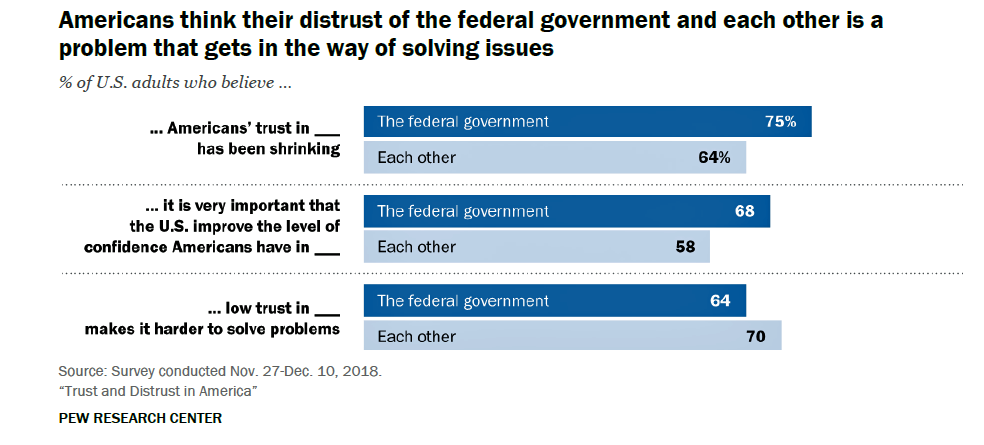
Two in three Americans believe their trust in each other has been shrinking. And most people connect the dots between that low level of trust and America’s ability to solve problems.
It’s been well-documented that Americans’ trust in institutions, and especially government and media, has eroded over the past decade. I’ve tracked that social trend here in Health Populi each year since covering the Edelman Trust Barometer, which has traced the downward sloping curve on trust globally and certainly in the U.S.
The precipitous decline in trust in America among fellow Americans is described in Pew Research Gr0up’s report, Trust and Distrust in America, published July 22, 2019.
The report is, sadly, ironically, very well-timed for this very moment in U.S. political, social and healthcare history.
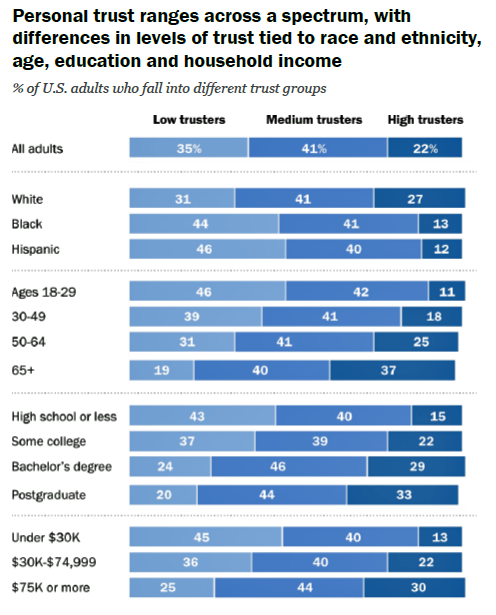 Of the many insights we can gather from this impactful study, this second chart tells many stories in one graphic.
Of the many insights we can gather from this impactful study, this second chart tells many stories in one graphic.
Personal trust varies by demographics — if you’re white, wealthy, and college-educated, you’re more likely to have higher levels of trust, Pew found. Less education is a risk for lower trust, as is having lower income, and being a person of color.
In a word, if you are of higher socioeconomic status in America, you can afford to hold greater levels of trust in institutions and in other people.
This holds true for health care access, burdens of chronic disease, health literacy, and by definition access to the social determinants of health the bolster well-being.
As the Pew analysis explains, the kind of income and other socioeconomic inequality relationships we see in “pure” market and commercial worlds also holds true for the bond of personal trust in America.
Know that such trust also extends to scientists, the military, police officers, and public school principals, where people with higher levels of trust have faith in these key leadership groups more than people who have lower levels of trust.
At the bottom of that trust-list across all levels of trust?
By far, it’s “Elected Officials.”
One note of convergence, perhaps, is worth concluding my take on the Pew report above the digital fold’s “Hot Points,” below. That is to identify several areas where Democrats and Republicans tend to agree: that it’s important to improve the level of confidence Americans have in the Federal government, it’s important to improve the level of confidence Americans have in each other, and it is possible to improve the level of confidence in one another.
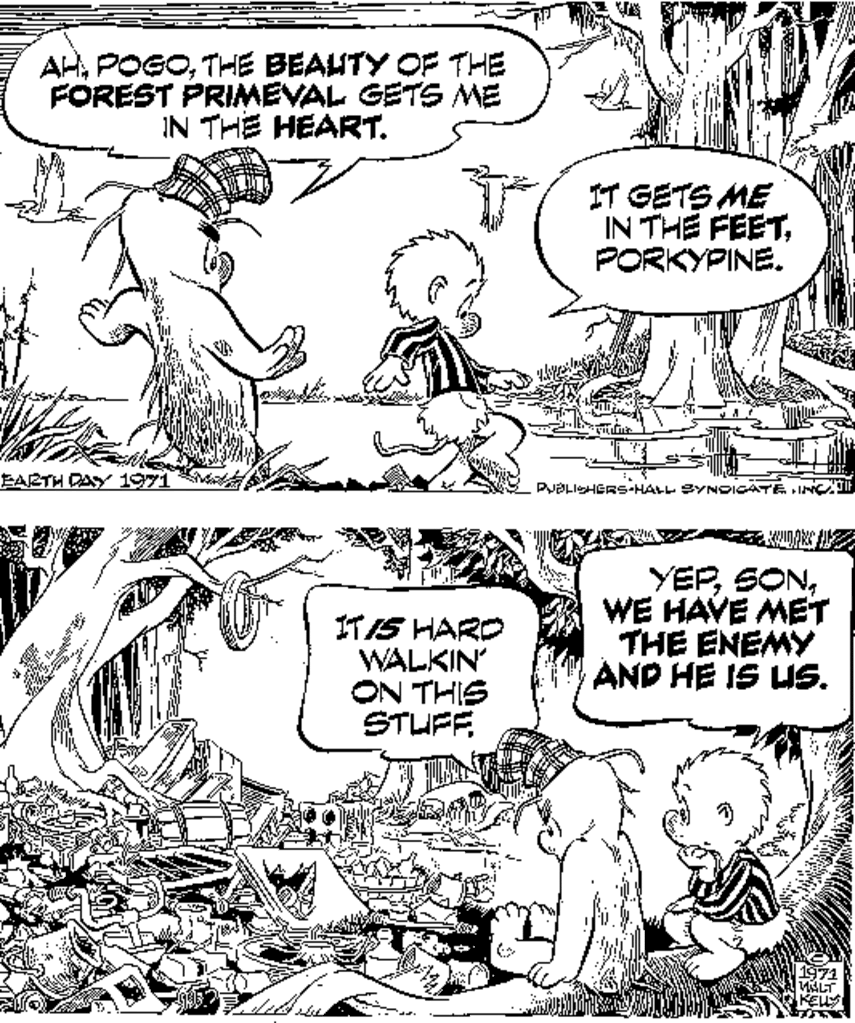
Health Populi’s Hot Points: This last point gives us some hope, perhaps.
However, this very sad week began with the weekend’s gun shootings in El Paso and Daytona in which dozens of people lost their lives to automatic weapons meant for the Killing Fields in two mid-sized American towns. Walt Kelly ‘s “Pogo” comes to my mind.
The key iconic quote that keeps ringing in my ear was Pogo’s observation that, “We have met the enemy and he is us.”
Kelly coined that saying by riffing on a message sent by General William Henry Harrison after he won the Battle of Lake Erie; after victory, he wrote, “We have met the enemy, and they are ours.”
Kelly’s take was in the context of McCarthyism. In 1953, Kelly wrote, “Resolve then, that on this very ground, with small flags waving and tinny blasts on tiny trumpets, we shall meet the enemy, and not only may he be ours, he may be us. Forward!” (You may be interested to know that this Kelly quote was discussed in a book called Walt Kelly and Pogo: The Art of the Political Swamp. Plus ça change…).
In listening to a cable news channel to keep updated on the shooting events and outcomes of the victims involved, I just heard Eddie Glaude, Professor at Princeton, say that we cannot blame this week’s shootings on anyone but ourselves.
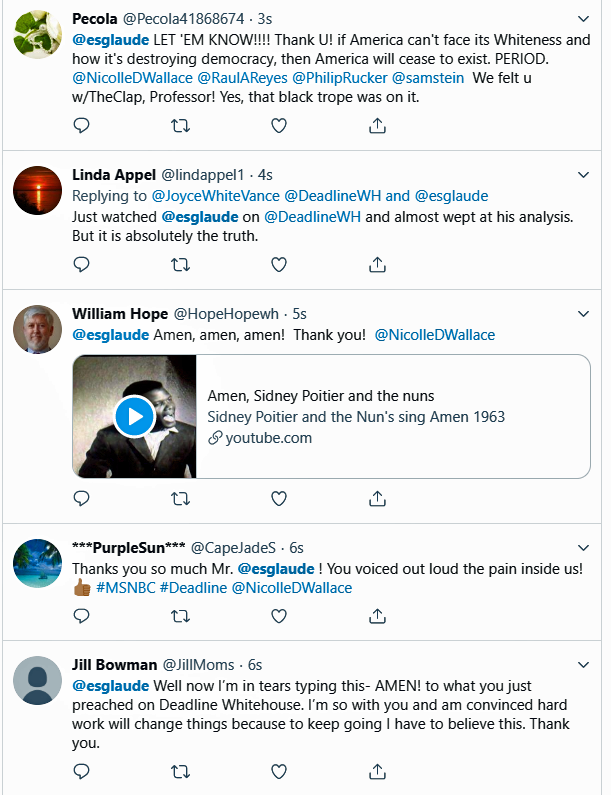 Eddie said, with passion and such deep sadness, “This is on us.”
Eddie said, with passion and such deep sadness, “This is on us.”
I’ve copied just a few of the tweets that just resulted, in a matter of minutes, following Professor Glaude’s analysis.
Hate in America is our ugly under-belly. It’s a social determinant of ill health, more than ever in my own lifetime. Our lack of trust, and lack of love for our fellow brothers and sisters is, literally, killing us — whether through loneliness in older or younger age, through anxiety and depression, through eating our way to short-term happiness, by binge drinking, solving pain through consuming synthetic drugs, or picking up a gun fitted with high capacity options.
And so “Forward” we go, knowing that loving our neighbor is the best revenge.
Oh, and legislation that once and for all realizes that guns are a public health threat at least as much as cancer, HIV/AIDS, and opioid addiction. That’s the link to the American College of Physicians’ call for gun legislation, and here’s a link to a report from the National Academies of Science on the role of health systems to prevent firearms injuries and deaths.
In closing, the last chapter of my book, HealthConsuming, talks about Americans “Becoming Health Citizens.” I wrote, “The phrase, ‘safety and happiness,’ was an 18th-century update of the ancient Roman idea that the supreme guide for all political decision-making was salus populi,” the health and well-being of the people.
Christakis and Fowler wrote that, “If we are connected to everyone else by six degrees and we can influence them up to three degrees, then one way to think about ourselves is that each of us can reach about halfway to everyone else on the planet.”
Let’s try to reach each other, at least, in America. While the planet’s in some level of pain, we in the U.S. need each other more than ever, mind, body and spirit.


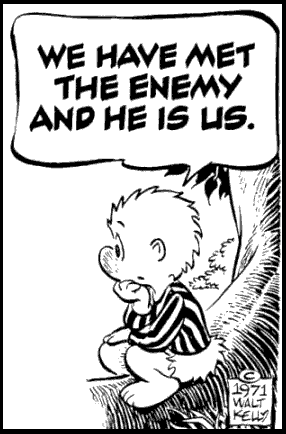



 Grateful to Gregg Malkary for inviting me to join his podcast
Grateful to Gregg Malkary for inviting me to join his podcast  This conversation with Lynn Hanessian, chief strategist at Edelman, rings truer in today's context than on the day we recorded it. We're
This conversation with Lynn Hanessian, chief strategist at Edelman, rings truer in today's context than on the day we recorded it. We're